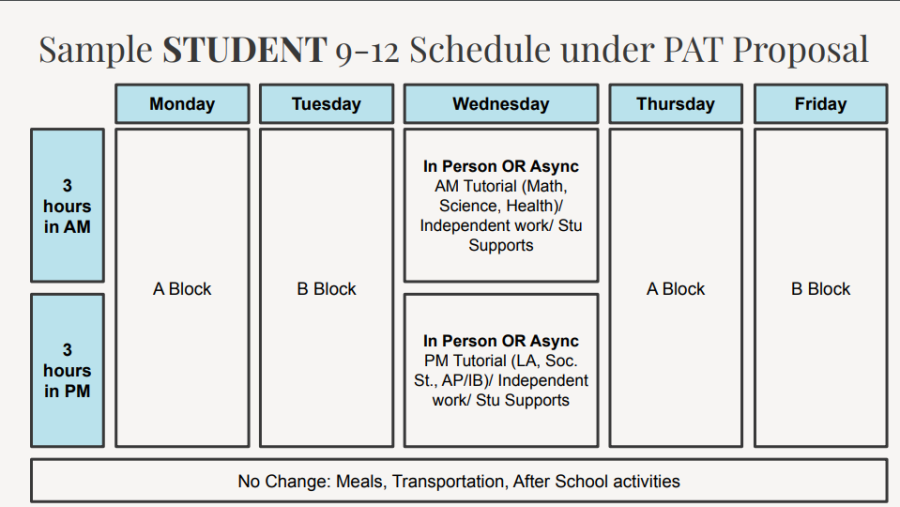Weekend Wednesday or Valuable Learning Tool?: The Students
January 19, 2022
In school districts’ decision making, some voices often remain unheard, namely the group most influenced by the district’s decisions: the students.
On December 16th and 17th, the Portland Association of Teachers (PAT) entered discussions with Portland Public Schools (PPS) about their proposal for asynchronous Wednesdays. As of January 3rd, however, their requests were not answered.
“It became abundantly clear that the District wasn’t willing to offer any significant workload relief for educators, or any meaningful improvements in student safety or student academic/emotional support,” the PAT bargaining team wrote in an update on their website. On January 3rd, they decided to withdraw from future discussions surrounding this topic.
In this decision, PPS has resisted the wishes of not only teachers, but students. In a poll of 21 Ida B. Wells students from all grade levels, 71.4% of students said they liked the Asynchronous Wednesday proposal, while 23.8% didn’t. 4.8% were undecided.
With such a majority, it appears PPS has overlooked the large number of students supportive of the proposal. Many students think that an asynchronous day would reduce their stress and, overall, benefit both teachers and students by giving them more work time.
“I feel like both teachers and students haven’t had adequate time to prepare for returning to full time in-person learning yet,” said Adam Biggs, a junior at Ida B. Wells. He thought that a midweek asynchronous day would create a better learning environment during the rest of the week.
Many other students cited the wasted time during all-eight days as one of their primary reasons for wanting to switch to the asynchronous Wednesday schedule.
“It [the asynchronous Wednesday schedule] helps solve for the poor attendance levels and inefficiency of all-8 fridays, while simultaneously providing consistent time and space for students to get additional support,” said Cara Weathers, a senior at IBW.
The majority of students feel that all-8 Fridays are not properly used. 45 minute class periods are hardly enough time for proper instruction—especially when both teachers and students are accustomed to 90 minute periods during the rest of the week.
Junior at IBW, Orion Hess, feels strongly about this inefficiency. “I would be happy to have school extended by even a couple weeks to make this work,” he said. The extending of the school year may be an issue PPS faced when considering the asynchronous Wednesday plan due to one missed school day a week. Regardless, students are willing to make this difficult change if all-eight days are replaced.
However, inefficiency isn’t the only problem when it comes to the current schedule, there’s something else to worry about: students’ mental health.
Students are feeling the strain from going online for every class last school year to going to full-time, in person school every day. Five months in, the effects are beginning to show.
“School is incredibly stressful for me, and even the slightest reprieve would be a weight off my shoulders,” said Sarah Brown, a senior at IBW.
Amy Elliot, a junior at IBW,shares this sentiment. She liked the Wednesday proposal, saying that with its establishment, “Students can do what is best for their education and mental health.” The option of going into in-person school or not on Wednesdays allows students control over their learning. If they make the right decisions, they can truly make their education work for them.
However, it all hinges on if students can make the right choices for themselves, and some students believe that they won’t.
“I think making it optional, whether or not people treated it as async or in person, would make it difficult for people to actually find the motivation to go to school—even if they needed it—because of how easy it would be to just stay home and do nothing,” said Alex Peltz, a junior at IBW. He explained that the choice of going into the building is the issue within the asynchronous Wednesday schedule. “I would be fine with continuing for all days or making one day fully asynch, but I don’t like Wednesdays being both,” he said.
When it comes to students making choices about their own learning, students themselves acknowledge the risks.
“I personally don’t like the lack of structure…I don’t have enough executive function to do work without the school structure,” said Callan McLoudrey, a junior at IBW.
Students making their own schedules is both a positive and negative in the asynchronous Wednesday schedule. For motivated students, it may provide a perfect time to catch up on work or get help from teachers. For less motivated students, Wednesdays may be an entirely wasted school day.
Although the 23.8% of students who dislike the proposal are present, the majority of students are in favor of asynchronous Wednesdays. Despite their strong opinions, student voices have largely been ignored in PPS’s decision.
How will they respond to the next student issue? Will they continue to make decisions without input from students? Asynchronous Wednesdays may not become a reality, but in that decision, PPS has overlooked thousands of students who could use that day wisely.



